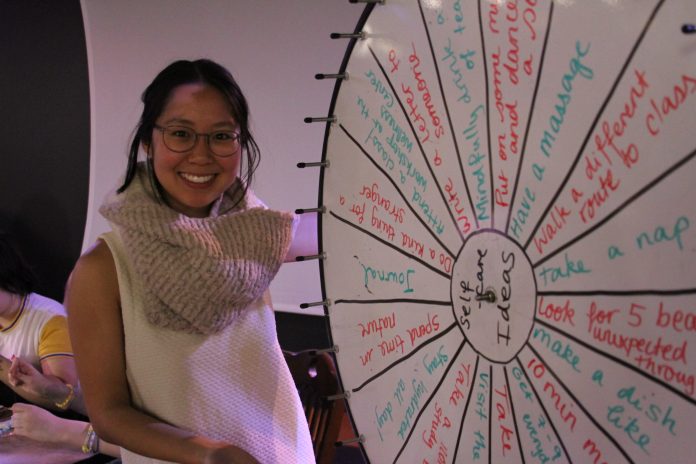Student organizers welcomed activist Ryan Sallans to campus Feb. 26 as part of the College of William and Mary’s National Eating Disorder Awareness week. Sallans spoke about his lifelong battles with body image and explained how eating disorders serve as proxies for deeper personal issues.
Sallans’s talk focused on his struggles with body dysmorphia and his complicated relationship with gender identity. As a transgender man, he is a prominent advocate for both LGBTQ rights and public awareness regarding eating disorders.
One of NEDA Week’s student coordinators Laila Drury ’19 introduced Sallans’s story to the audience.
“… Our three main goals are to raise awareness, bash stigma and foster community,” Drury said. “We’re doing that throughout the week … we are so honored to have Ryan here to talk to us about the intersection between transition and eating disorder recovery, truly a unique perspective that is so relevant to today’s day and age.”
“… Our three main goals are to raise awareness, bash stigma and foster community,” Drury said.
In addition to being a published author, Sallans also travels across the nation giving lectures on the intersection between his gender identity and experiences with disordered eating.
According to Sallans’s estimation, his visit to the College marked his 72nd campus visit since he began sharing his story with university students in 2005. When talking to college students, Sallans said that eating disorders are chronically misunderstood diagnoses. He said students often cannot sufficiently grasp their root causes, symptoms and significance. To bridge that informational gap, Sallans explained facts about the hereditary and environmental risk factors for eating disorders.
Furthermore, Sallans reminded the audience that certain populations are especially prone to unhealthy relationships with food, including transgender individuals. He segued into discussing his upbringing, noting that he developed an eating disorder while combating insecurities with his gender identity.
Sallans said that when he was young, he lacked the language to express his discomfort with being assigned female at birth and with living as a woman. From the age of seven onward, Sallans said he felt uncomfortable in his skin, and felt that being viewed as a girl was incompatible with his personal gender identity.
“Around age seven … I was looking in the mirror, and it just hit me,” Sallans said. “My body is female, and I didn’t know what to do with that, because I didn’t really understand it before that time.”
This discomfort amplified during Sallans’s youth until he eventually began depriving himself of food in order to craft a more angular physical appearance that more closely resembled the male body he subconsciously identified with.
Sallans continued to struggle with an eating disorder throughout college. While he increasingly felt more and more uncomfortable identifying as female, he clung to the idea that if he became more “feminine” — which at the time, he interpreted as becoming skinnier — he would feel more at ease.
“Going into my sophomore year, over that summer, I said to myself, ‘You need to change, you need to become more feminine, because if you’re not more feminine, people aren’t going to love you, it’s going to be hard for you to find a job … guys aren’t going to date you, your parents aren’t going to be proud of you,’” Sallans said. “For me, when I heard that word [feminine], the first descriptor that popped into my head was skinny. I then engaged in dieting behaviors, and unfortunately those dieting behaviors took me to the point where nine months later, I was being diagnosed with anorexia nervosa.”
While Sallans’s battle with anorexia almost ended his life, he credits his eating disorder with getting him the therapy he needed to come to terms with his gender identity. This led him to accept his identity as a transgender man.
“[My diagnosis] saved my life,” Sallans said. “It forced me to go to therapy. It forced me to start exploring the things that I was running away from, the things that I didn’t want to talk about.”
“[My diagnosis] saved my life,” Sallans said.
The process of seeking treatment for his anorexia was a lengthy one, but Sallans assured the audience that recovering from eating disorders is possible, and that individuals can emerge stronger on the other side for having conquered them.
His assurance was echoed by NEDA Week’s organizers, who brought Sallans to campus as part of a broader message that students are worthy of treatment and positive self-growth.
One of NEDA week’s facilitators Sam Phillips ’21 said that Sallans’s talk and the week as a whole were designed to empower students, both on a community and individual level.
“This week built a community of students, not only in recovery for eating disorders, but those who have felt less than or not enough,” Phillips said in an email. “We wanted to bring people together and remind them that they are not alone, and they are loved.”
“We wanted to bring people together and remind them that they are not alone, and they are loved.” Phillips said in an email.

